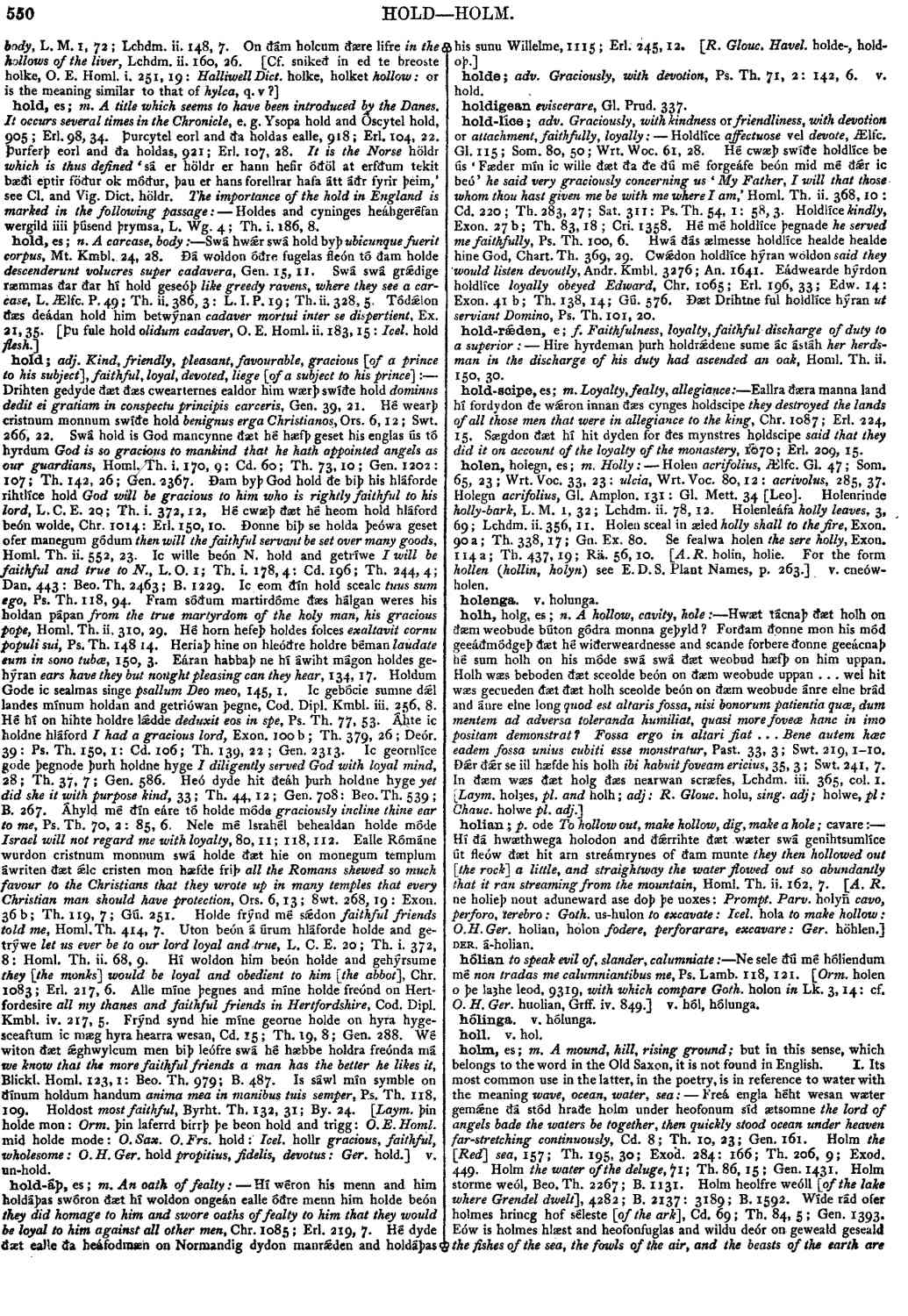holm
- noun [ masculine ]
-
Freá engla héht wesan wæter gemǽne ðá stód hraðe holm under heofonum síd ætsomne
the lord of angels bade the waters be together, then quickly stood ocean under heaven far-stretching continuously,
- Cd. 8; Th. 10, 23; Gen. 161.
-
Holm
the [Red] sea,
- 157; Th. 195, 30; Exod. 284: 166; Th. 206, 9; Exod. 449.
-
Holm
the water of the deluge,
- 71; Th. 86, 15; Gen. 1431.
-
Holm storme weól,
- Beo. Th. 2267; B. 1131.
-
Holm heolfre weóll [
of the lake where Grendel dwelt
], 4282; B. 2137: 3189; B. 1592. -
Wíde rád ofer holmes hrincg hof séleste [
of the ark
], Cd. 69; Th. 84, 5; Gen. 1393. -
Eów is holmes hlæst and heofonfuglas and wildu deór on geweald geseald
the fishes of the sea, the fowls of the air, and the beasts of the earth are delivered into your hand,
- 74; Th. 91, 20; Gen. 1515.
-
Wið holme foldan sceldun
guarded land against sea,
- Exon. 22 a; Th. 61, 4; Cri. 979.
-
On holme, 97 a; Th. 363,
- 9; Wal. 51: Beo. Th. 1090; B. 543: 2875; B. 1435.
-
Æt holme
by the sea,
- 3832; B. 1914.
-
Sealt wæter hreóh mé holme besencte
tempestas demersit me,
- Ps. Th. 68, 2.
-
Ðá wæs heofonweardes gást ofer holm boren
the spirit of God moved upon the face of the waters,
- Cd. 6; Th. 8, 7; Gen. 121.
-
Léton holm beran
they let the sea bear him,
- Beo. Th. 96; B. 48.
-
Ofer wídne holm,
- Exon. 79 a; Th. 296, 23; Crä. 55.
-
Ofer heánne holm,
- Elen. Kmbl. 1962; El. 983: Cd. 213; Th. 266, 4; Sat. 17: Exon. 77 b; Th. 291, 14; Wand. 82.
-
Ðá ic on holm gestáh
when I embarked,
- Beo. Th. 1269; B. 632: Andr. Kmbl. 858; An. 429.
-
Heá holmas
deep waters,
- Exon. 54 b; Th. 193, 17; Az. 123.
-
Holmas dǽlde waldend úre
God divided the waters,
- Cd. 8; Th. 9, 24; Gen. 146: Exon. 93 a; Th. 349, 31; Sch. 54.
-
Hider ofer holmas
hither over the waves,
- Beo. Th. 485; B. 240.
-
Windge holmas
stormy seas,
- Exon. 20 a; Th. 53, 26; Cri. 856.
-
Holma begang
the way across the waters,
- Ps. Th. 138, 18: Andr. Kmbl. 390; An. 195: Bt. Met. Fox 11, 69; Met. 11, 30.
-
Holma geþring,
- Beo. Th. 4271; B. 2132.
-
Holma gelagu,
- Exon. 82 a; Th. 309, 28; Seef. 64.
-
Ðý ilcan geáre wæs ðæt gefeoht æt ðam Holme Cantwara and ðara Deniscra,
- Chr. 902; Th. 180, col. 2.
-
Hér fór Cnut Cyng tó Denmearcon mid scipon tó ðam holme æt eá ðære hálgan,
- 1025; Erl. 163, 7.
Bosworth, Joseph. “holm.” In An Anglo-Saxon Dictionary Online, edited by Thomas Northcote Toller, Christ Sean, and Ondřej Tichy. Prague: Faculty of Arts, Charles University, 2014. https://bosworthtoller.com/19460.
Checked: 0